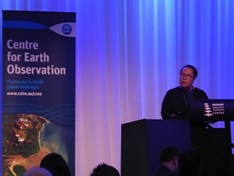Nearly 100 delegates from Pacific Island Countries, CROP agencies, the world’s leading providers in satellite Earth Observation (EO) data, CSIRO, and the governments of Australia, the European Union, and France, met in Brisbane, Australia on the 11th and 12th of October to share expertise and begin a conversation on the unique EO data needs of Pacific Island nations and how impactful assistance, including access, training, and development of useful products, can be cooperatively delivered. From SPREP, Mr. David Loubser presented two short papers on EO at SPREP and EO and coastal ecosystems, while Dr. R. Duncan McIntosh facilitated a session on research needs and validation of EO data. Attendees identified and mind mapped common needs under the categories of; local engagement, capacity building, national sovereignty, infrastructure, observations, trusted information, platform function, and thematic areas including: disasters, national security, environment, food security, planning, and cross cutting areas of climate and SDGs. Attendees also developed priority actions towards meeting those needs. The lack of high resolution EO data across the region was noted and representatives from the French Government, the EU and CSIRO committed to raising this with their respective governments and at the upcoming Group on Earth Observations (GEO) meeting in Kyoto.
Island States in the Pacific have unique earth observation needs. These islands are often small and remote and are developing their capacity to access and use Earth Observation (EO) data. This information is used to assess climate change impacts, for land use and environmental planning, and to report on the United Nations Sustainable Development Goals (SDGs). Much EO data available is free, but developing economies still often struggle with capability to access the overseas data archives and to utilise EO in a meaningful way. In the Pacific region, the data may be difficult to access with existing communications infrastructure, or not be in a form that can be easily used by non-experts, or not be of a high enough resolution to be useful, and metadata and products derived from the data may also not be available in the local languages or presented in terms that match local descriptions of the landscape.
 |
| Dame Meg Taylor gives the keynote speech: Regional Overview of Pacific Policy Frameworks and Needs |
Key stakeholders and attendees included policy and technical leaders from the Pacific along with representatives from CSIRO, Geoscience Australia, New Zealand, the French Embassy, the EU and regional and international EO agencies amongst others. Attendees shared presentations and worked in breakout groups to identify the EO needs of Pacific Island states for environmental monitoring and reporting, areas of common interest and expertise between Australia, New Zealand, UK, France and the EU in EO, discussed opportunities and developed an action plan and proposals for implementation of a common data platform that meets the needs of the island states in the region, linked to the common interests of EO providers. The workshop concluded with attendees brainstorming towards an action plan for implementation of an EO Data platform to serve Pacific island needs.

